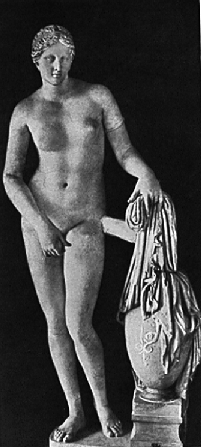A Historical Perspective: Ancient Theories
The Stoics (~308 BC)
Praxiteles: Aphrodite of Cnidus (370-330 BC) 
-
Zeno's (336?-264? BC) school of thought. Nature is made of order and reason.
-
Animals have the expression, but not the experience of emotions:
-
According to Cicero: "All disorders and perturbations of the mind arise
from a disregard of reason, hence they arise only in men; for though beasts
act similarily, they are not similarily pertubed".
-
According to Seneca: "dumb brutes do not have human affections, but have
similar impulses".
-
There are 4 classes of affections:
-
There are 3 'good' affective states (moods, habits, dispositions).
-
Cheerfulness (good fellowship, good temper): Rational elation (by opposition
to pleasure).
-
Discreteness (shame, fear of dishonor): Rational disinclination (by opposition
to fear).
-
Virtuous will (benevolence, affability, cordiality): Rational inclination
(by opposition to appetite).
-
The natural affections (kinship, companionship)
-
The necessary affections: the physical pleasures and pains.
-
The Passions
-
Violent perturbation of the Soul: Excessive irrational impulse (instinctive
tendency to action), contrary to Nature.
-
Disease of the Soul, sickness and infirmity.
- The best life involves the suppression of the passions from all aspects
of mental life, unilke the peripatetics
who think they should simply be controled .
-
They are a kind of judgment/opinion - The first intellectualistic theory
of emotion.
-
There are 4 basic and fundamental passions:
-
Appetite or Desire : 'Irrational impulses towards' - Opinion of
coming good, potentialy beneficial.
-
Fear : 'Irrational recoil from, accompanied by a lowering of vital
energies' - Opinion of intolerable and soon to occur evil.
-
Pleasure or Delight : 'Irrational expansion or elation of the mind'
- 'Recent' opinion of good, appropriate for mind elation.
-
Pain or Grief : 'Irrational contraction or depression of the mind'
- 'Recent' opinion of evil, appropriate for mind depression.
-
All other emotions are derived (subclasses) from the 4 basics. For example:
-
Envy = Grief at another's property which causes no injuries to the envious.
-
Mourning = Grief at the death of a dear person.
- Some Stoics: Zeno, Chrysippus , Posidonius
, Hecato, Herillus and Sphaerus.
For More Information
The Cicero Home
Page.(Univ. Austin, Texas)
Editor: Jean-Marc Fellous
